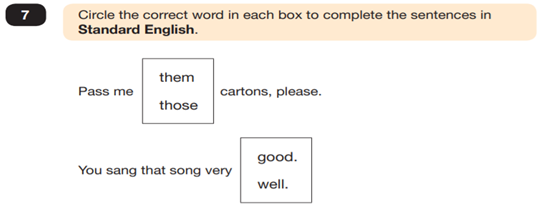Have you ever found yourself lost in the labyrinth of grammatical terms? If so, you’re not alone. The current buzz about the Key Stage 2 SPaG (Spelling, Punctuation, and Grammar) test might feel like deciphering a foreign language for many.
Imagine this: you’re cruising through your writing journey, confident in your skills, and then bam! The SPaG test hits, and suddenly, you’re facing a terrain filled with terms like “subjunctive mood” “adverbial phrase” and “relative clauses.” Sounds relatively insane, right? Well, this is a reality for England’s Key Stage Two students (ages 7 – 11) who have been obliged to endure this “rigorous new [SPAG] test” to prove they can write “properly, creatively and effectively” (Department for Education, 2013.)
Literacy challenges
Let’s rewind to 2012, where the English government’s performance tables were looking rather miserable – “the worst in the developed world for literacy” (Clarke, 2016) to be precise. Lord Bew’s ‘Key Stage 2 Testing Assessment and Accountability Report’ didn’t sugarcoat the failure of the education system, pointing out “significant issues with the existing writing national curriculum test” (DFE, 2011.) Enter 2013, and the newly appointed SPaG test is trialled, containing grammatical elements that even some undergraduate students would shiver at. Former Education Minister Elizabeth Truss (and more recently, former UK Prime Minister, 2022) claimed that despite the uproar, the new assessment was essential. “Why”, you ask? Well, Truss believed it was high time for primary schools to roll up their sleeves and “ensure that children leave primary school confident” with complex grammar. (DFE, 2013.)
However, not everyone agreed with Truss’s educational evolution. Linguist David Crystal, while a staunch advocate for grammar teaching, aligns himself with the opposition when it comes to this testing method. In his blog (2013), Crystal asserted that the conventional approach of having children identify sentence components out of context does little to enhance their writing abilities. He contended that a shift in focus was imperative, emphasizing the importance of helping children comprehend the reasons behind the use of specific grammatical elements, rather than just giving them the means to label it.
Whose Standard?
In his article on the role of Standard English Milroy (1999) highlighted that many linguists frequently endorse the instruction of clear-cut grammatical rules as a vital resource, particularly for children who lack exposure to ‘Standard English’ at home. Here is the twist – the tests designed to uplift children’s confidence and writing skills might be conveying conflicting messages. Is there a risk that these assessments unintentionally stigmatise unique dialects as ‘incorrect’? The questions evaluating familiarity with Standard English often overlook the fact that children inherently communicate in diverse dialects. However, Carter (1999) argued that a child who is not exposed to such teachings would face significant disadvantages, leading to disempowerment.
This prompts us to reflect on whether the commendable efforts by the government to improve children’s education could unintentionally yield negative consequences, causing students to scrutinise their own speech patterns. According to Thomason and Ward (2009), the effective teaching of grammar could be significantly enhanced if it were presented as a versatile “tool” for children to wield, thereby augmenting their language proficiency. Striking a delicate balance between imparting essential grammar knowledge and appreciating the richness of linguistic diversity is key.
More than one right answer?
Children’s writer Michael Rosen (2015), a famous adversary of the SPaG test, dauntlessly challenged the conventional notion of a singular correct answer when it comes to grammatical description. Rosen underscored scenarios, drawn from the 2016 test as an illustrative example, where children were assigned the challenge of matching prefixes to words. Rosen’s examination exposed the possibility of two acceptable answers and emphasising the intrinsic ambiguity in the assessment. In another blog, Rosen (2016) harshly critiqued the construction of the SPAG tests, identifying multiple inconsistencies that raise pertinent questions about the fairness of assessing children when those formulating the tests cannot agree upon an answer.
Adding fuel to the fire, discussions emerged between the then Minister of Education, Nick Gibb, and an interviewer regarding the interpretation of the term “after” within the sentence “I went to the cinema after I’d eaten my dinner.” This sparked a debate on whether “after” functions as a subordinating conjunction or a preposition (Aarts, 2016.) Surely if our adults are puzzled, we cannot expect our children to have the answers?
Wyse et al (2013), similar to Rosen, asserted that the questions in the SPAG test, particularly those eliciting controversy, are “dry as dust, decontextualised and old-fashioned”. They concluded that a mere labelling approach, as exemplified in such questions, does not facilitate meaningful learning about the English Language for children.
Terminologyitis?
Rosen’s critique of the SPAG test goes beyond the mere examination of its terminology; it encompasses concerns about the temperament and construction of the questions posed (2015.) In his view, he contends that the test falls short as a tool for enhancing children’s writing through metalanguage or analytical approaches, as it rigidly adheres to a binary perspective on grammar, neglecting to consider the dynamic influence of context in language and emphasising clear “right and wrong” answers (Rosen, 2015.)
Teachers’ union leader Mary Bousted (2016), argued that an emphasis on grammar terminology through “rigorous testing” (DFE, 2013) may not necessarily translate to enhanced writing abilities in children. According to Rosen (2015), the SPaG test is afflicted with “terminology-itis”, where an overemphasis on complex grammatical terms may not significantly contribute to improving the writing skills of our youngsters. Supporting this, Bousted suggested that encouraging extensive reading and fostering creativity through storytelling might be more effective in nurturing writing abilities than dedicating time to grammatical descriptions and testing.
In Bloom’s (2017) work, he aligns with Rosen’s argument asserting the existence of a “significant and persistent mismatch” between academic evidence supporting government policies and the actual implementation of these policies in the realm of teaching grammar to children in schools. Mansell’s report in The Guardian (2017) resonated with public sentiments, reflecting apprehensions that “strict [grammar] rules” might impede the creativity of young individuals, and portray writing as a restrictive and confining endeavour. This multifaceted discussion underscores the ongoing debate over the efficacy and fairness of grammar testing in shaping the language skill on creative expression of our budding wordsmiths.
Improving standards?
Regardless the ongoing protests, let’s not ignore the results. In 2017, a noteworthy 77% of students reached the expected standard in the SPaG tests, according to Ward (2017.) This begs the question: Are the tests achieving their intended outcomes, or is there more to the story? As the debate rages on, one thing is clear – the SPaG tests have stirred the educational pot, sparking discussions about the best way to nurture our young wordsmiths. Whether you’re on Team SPaG or cheering for alternative assessment methods, the journey towards effective literacy education continues.
References
Aarts, B. (2015, November 6.) The study of grammar is interesting in its own right. Grammarianism. https://grammarianism.wordpress.com/2015/11/06/the-study-of-grammar-is-interesting-in-its-own-right/
Bloom, A. (2017, November 28). Teaching grammar does not improve children’s writing ability, research finds. Tes.com. https://www.tes.com/magazine/archive/teaching-grammar-does-not-improve-childrens-writing-ability-research-finds
Bousted, M. (2016, April 19). ‘Our children are being set up for failure, stress, disappointment and disaffection.’ Tes.com https://www.tes.com/magazine/archive/our-children-are-being-set-failure-stress-disappointment-and-disaffection
Carter, R. (1995). Standard Grammars, Spoken Grammars: Some Educational implication. In T. Bex & R.J. Watts (Eds.) (1999), Standard English: The widening debate (pp. 149 – 169). London: Routledge.
Clarke, E. (2016, March 12). Children love to learn grammar and thanks to Michael Gove they will get the chance. Spectator.
Crystal, D. (2013, May 5). On a testing time. David Crystal blog. https://david-crystal.blogspot.com/2013/05/on-testing-time.html
Department for Education, (2011). Review of key stage 2 testing, assessment, and accountability. https://www.gov.uk/government/publications/independent-review-of-key-stage-2-testing-assessment-and-accountability-final-report
Department for Education, (2013). New grammar, punctuation and spelling test will raise children’s literacy standards. https://www.gov.uk/government/news/new-grammar-punctuation-and-spelling-test-will-raise-childrens-literacy-standards
Department for Education, (2022). Key Stage 2 tests: 2022 English grammar, punctuation, and spelling materials. https://www.gov.uk/government/publications/key-stage-2-tests-2022-english-grammar-punctuation-and-spelling-test-materials
Mansell, W. (2017, May 9). Battle on the adverbials front: Grammar advisers raise worries about says test and teaching, The Guardian. https://www.theguardian.com/education/2017/may/09/fronted-adverbials-sats-grammar-test-primary
Milroy, J (1999). The consequences of standardisation in descriptive linguistics. In Bex. T & R.J. Watts (Eds.) (1999), Standard English: The widening debate (pp. 16 – 39). London United Kingdom: Routledge.
Rosen, M. (2015, November 3). Dear Ms Morgan: in grammar there isn’t always one right answer. The Guardian. https://www.theguardian.com/education/2015/nov/03/morgan-grammar-test-right-answer-spag-english-spelling-punctuation-grammar
Rosen, M. (2016, April 16). Why SPaG is nasty and dangerous. Michael Rosen. https://michaelrosenblog.blogspot.com/2016/04/why-spag-is-nasty-and-dangerous.html
Thomason, T. Ward, G. (2009). Tools, not rules, Durham, CT: Eloquent Books.
Ward, H. (2017, July 4). Sats: 61 percent of pupils reach expected standard in three Rs. Tes.com. https://www.tes.com/magazine/archive/sats-61-cent-pupils-reach-expected-standard-three-rs
Wyse, D. Jones, R. Bradford, H. Wolpert, M. (2013). Teaching English, language, and literacy (3rd Ed). Abingdon, United Kingdom: Routledge.














